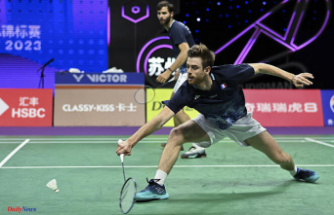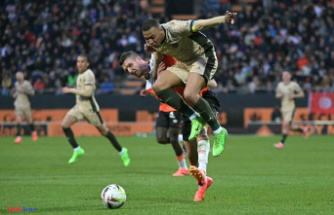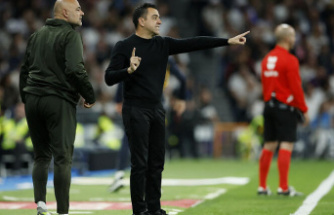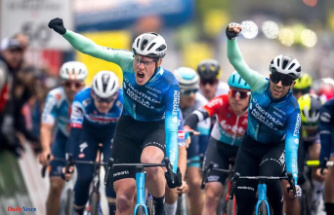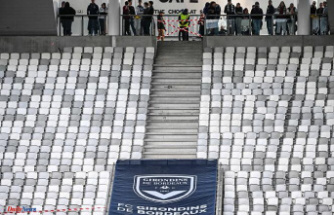Eintracht Frankfurt was awarded a penalty at the last minute in Berlin, which at first glance seems reasonable. Nevertheless, the referee takes him back after consulting the VAR – and later explains his reasons in detail. Nevertheless, questions remain.
The 89th minute of the game between Hertha BSC and Eintracht Frankfurt (1:1) was played in Berlin's Olympic Stadium when the guests tried again to score the winning goal. Randal Kolo Muani put the ball through to Rafael Borré on the edge of the area, who passed goalkeeper Oliver Christensen on the left corner of the area and then went down. Referee Frank Willenborg gave the penalty without hesitation, and he also cautioned the Hertha keeper. The referee had assessed his use as a ball-oriented thwarting of an obvious goal chance and punished him accordingly with a yellow card.
If there is a penalty kick, the video assistant's review of the decision is mandatory. When Markus Schmidt's check in Cologne was complete, after a brief consultation with his VAR, the referee ran to the monitor to look at the pictures again himself. The on-field review lasted exactly 90 seconds, in which Willenborg showed the duel between Christensen and Borré several times and from different perspectives. He then took back his penalty whistle and the yellow card and restarted the game with a dropped ball.
It was a decision that evoked mixed reactions. Sandro Schwarz, for example, welcomed him: "Not every contact is a foul," said the Hertha coach. Frankfurt goalkeeper Kevin Trapp, on the other hand, said: "The video referee is there to revise clear wrong decisions, and if the referee needs ten minutes to take back this decision, then for me it's not a clear wrong decision." Trapp's Berlin counterpart Christensen just missed the ball in the scene in question and briefly hit Borré's right foot with his left hand. In any case, there was no classic "swallow".
In an interview with the broadcaster Sky, the referee later commented in detail. "My perception on the pitch was that the goalkeeper would take the foot away from the player," he explained. But this perception was refuted by the pictures. Although there was contact, it was "not the cause of the player falling," said Frank Willenborg. It was just a "strip" and not a "pulling away" of the foot - in other words: an impulse with less intensity. The referee referred to his generally generous interpretation of the rules when assessing duels in this match and remarked understandably: "I would not have whistled for that small touch in midfield."
Ultimately, however, the question arises as to whether the decision made was so clear and obviously wrong that it should not be allowed to stand. Or whether there weren't arguments in their favour, even if there was more to a different decision. In the program "Doppelpass" Willenborg called this penalty a "cheap penalty", a "cheap penalty" that one should not give as a referee if possible. This designation does indeed fit the original decision - and yet there should only be a VAR intervention in the event of clear errors and not to turn a controversial decision into a less controversial one.
However, it is helpful to know how the VAR and the referee determine if there is a clear and obvious error. This is essentially done by the referee describing his perception to the VAR and the video assistant comparing it with the image material. If there is a clear discrepancy, the advice for an on-field review often follows. In the specific case, Frank Willenborg had communicated that he had noticed his foot "pulling away". But the pictures clearly didn't show that, they only showed a brief contact between Christensen's palm and Borré's ankle, which certainly didn't necessarily have to be assessed as the cause of the Eintracht attacker's fall.
Viewed from the outside, on the other hand, one tends to perceive the decision in its entirety, because it is not known exactly which observation the referee passed on to the VAR. This can lead to a situation where, for example, a penalty whistle is considered justifiable, the occurrence of which was nevertheless based on the referee’s incorrect perception, which in turn called the VAR into action. Without knowing the usual processes and what Frank Willenborg explained in the interview, Kevin Trapp's statement after the game seems at least understandable. Because is a decision really so clearly wrong if the referee on the monitor needs longer to come to a final verdict?
However, you also have to know one thing: when the referee rushes to the monitor, he completely re-evaluates the scene that is being shown to him. Of course, he will only go to the review area if the VAR recommends it because he has identified a wrong or missing perception of the referee. And of course, the referee will only change a decision if he is convinced that he was previously wrong or missed something essential. But what is crucial is that his original decision does not represent a barrier that he would first have to overcome.
Before the season, referee boss Lutz Michael Fröhlich and the project manager of the video assistants, Jochen Drees, noted at a media workshop in Frankfurt that criticism of the VAR in public was particularly strong when it was supposedly or actually wrong refrained from an intervention. The referee, it is often said in the media and by the clubs, should at least be given one more opportunity to look at the pictures himself before making an irrevocable commitment. On the other hand, an allegedly or actually unjustified intervention from Cologne is less likely to cause frustration.
That is why the video assistants were instructed to advise the referees to do an on-field review too often rather than too seldom. On the one hand, this is understandable, because in particularly controversial cases, the referee is the last person to see the pictures before the final decision is made. On the other hand, this can possibly lower the intervention threshold for the VAR to such an extent that the principle of only intervening in the event of clear and obvious errors is weakened. But that would contradict the basic idea of the video assistant. It remains complicated.
Regardless of this, thanks are due to Frank Willenborg for explaining his thoughts and procedure so comprehensively and in such a comprehensive manner. He didn't want to let a potentially game-changing penalty stand, which he was no longer convinced of after consulting VAR Markus Schmidt. "It is important to me that the right decision is made in the end," Willenborg told Sky. That's why he took the "time to evaluate it correctly". Thoroughness comes before speed. And transparency, as shown by the 43-year-old game director from Osnabrück, creates more acceptance.


